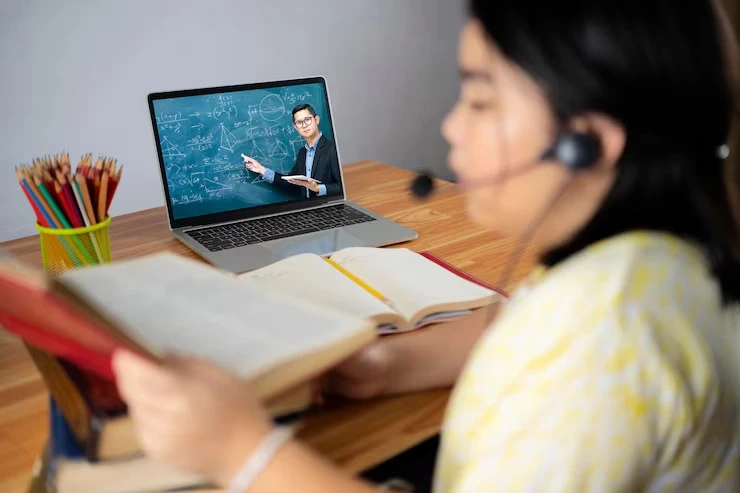The world of education is getting a new face! Digital technologies continue to make their way into classrooms, and teaching is becoming more and more dependent on technology. Welcome to this new space; if you are an NJ Education teacher who wants to succeed in this environment, then this is the perfect guide for you. Here are seven ways that will help make you an outstanding star of online classes. This will include how to make the lessons fun, establish a positive online class culture, and understand essential technologies. Here are the best tips to kickstart your online teaching and enhance your students learning and development.
Master the Technology
Master the art of upgrading yourself with the latest technology so that you can become an effective online NJ Education teacher. Know the tools of digital classrooms like Zoom, learning management systems (LMS) like Google Classroom, and other educational software.
Key Points:
- Learn the Basics: The first thing is to understand the basic functionalities of the selected tools. Understand how to join a meeting, mute and unmute your microphone, and activate the screen-sharing feature or a chatbox.
- Explore Advanced Features: Once you feel relaxed, go to the next level to try some features, for instance, the use of Zoom breakout rooms or the creation of engaging activities in LMS.
- Stay-Updated: With the ever-changing technology, keep a check on updates and new tools to upgrade your teaching skills.
Create Engaging Content
Interesting content makes students excited and eager to continue learning and studying. Online learning lacks the face-to-face element of an ordinary classroom, hence, your course has to be interesting.
Key Points:
- Use Multimedia: The use of videos and audio clips and even producing quizzes within the lessons makes the lesson more interesting.
- Tell Stories: Turn to narratives as a way of teaching. Stories can make the material more interesting and easier for students to recall.
- Visual Aids: Use infographics and slides to illustrate key points and make information easier to grab.
Foster an Interactive Environment
The best way to keep students engaged in an online classroom is interaction. Engage students and foster ways with which they can engage you and other students.
Key Points:
- Discussion Forums: Organise the teaching so that students can discuss in forums about knowledge and use knowledge to answer questions.
- Group Projects: Group the students so that they can work in groups and carry out group assignments and discussions.
- Live Sessions: Set up live classes where students can pose questions and engage in conversations in real time.
Personalize Learning
Each learner is different, and providing a custom approach can be useful to fix a student’s issues. Customizing your teaching approach can make a big difference in students\' success.
Key Points:
- Flexible Learning Paths: Switch up how you allow students to hand in their assignments in a way that is favorable to each student.
- Regular Feedback: Develop ways of giving constructive feedback that allows the student to grasp how they are doing in their studies and where they need to improve.
- Adaptive Learning Tools: Introduce and employ means that consider the students\' learning rate and modes.
Communicate Effectively
Maintaining clear communication is an essential factor in the online learning environment. Students must know their expectations and how to reach you if they have any queries.
Key Points:
- Clear Instructions: Ensure that you provide clear instructions on all assignments and activities given to the students. Try to point out information using bullet points or numbers.
- Regular Updates: Keep the parents informed of their child’s activities, upcoming tasks, and changes in the timetable.
- Open Channels: Ensure that you provide regular contact points through which students can communicate with you about any issues they face.
Maintain a Strong Online Presence
Having an active online presence is an essential element for creating a connection and trust with students. Being available and responding demonstrates that you care for their learning.
Key Points:
- Be Available: It is also important to make sure that students know your office hours and how to get in contact with you in case of any difficulties outside class hours.
- Professionalism: It is always good to keep your messages professional and polite. This sets the right atmosphere for learning.
- Social Media: Look at social media as a tool for sharing resources and information with your students and as a way to communicate with them informally.
Continual Professional Development
Education is always changing, and staying current with the latest trends and best practices is important. Your love for learning is fulfilling and provides the means how to stay updated.
Key Points:
- Stay Updated: Engage yourself more with educational blogs, webinar systems, and research articles in your chosen area of specialization.
- Join Professional Networks: Write for websites/blogs where educators gather and share information. These might give additional support, information, and ideas that can help.
- Take Workshops and Courses: Attend different training sessions and seminars to clarify new approaches and techniques of online education.
Conclusion
Taking the time and effort, building skills, and the right approach are the key steps to becoming an effective educator in the online environment. Understanding technology, generating interest in the content, encouraging participation, promoting student-teacher-personal contact, encouraging effective communication, emphasizing being well-established online, and ensuring continuous professional growth make it possible to succeed in a digital classroom for those applying for teacher jobs.
Always aim to develop the best learning climate for the students and have the best learning outcome. Follow these tips, and you will be on the road to achieving the goal. Happy teaching!
FAQs
- How can I make my digital classes more engaging for students?
Here are tips to help you also make your online classes enjoyable: use multimedia such as videos, quizzes, and infographics. Engage students through forums and live sessions so that they actively post and participate. Use narratives to make lessons more relevant and engaging.
- What tools should I learn to be an effective online educator?
Some of the important facilitation tools for online teaching are Zoom for video conferencing, Google Classroom for LMS, and applications like Kahoot or Quizlet for creating interactive content. To effectively teach classes, one should be open to learning more and updating themselves with new technologies.
- How can I personalize learning for my students in an online environment?
For better teaching, come up with individual paths to provide for each and every learner. Give feedback often and make it individual; use computational and learning techniques focusing on an individual student. It enables students to feel more appreciated throughout their learning process or studies.


